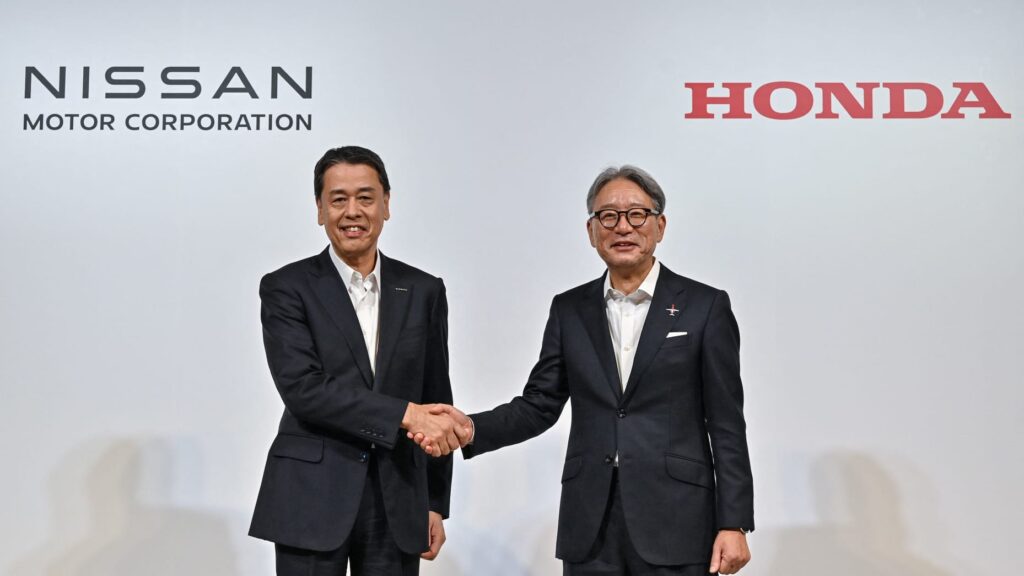The global automotive industry is undergoing an unprecedented transformation. As electrification, sustainability, and digitalization redefine the sector, staying ahead in this competitive market requires collaboration and innovation. Recent reports from the Nikkei newspaper suggest that Japanese automakers Nissan Motor Co. and Honda Motor Co. are in advanced discussions to merge, a move that could dramatically reshape the future of the industry.
The Proposed Merger: Key Details
According to the report, Nissan and Honda are considering forming a joint holding company under which they would operate collectively. This partnership, still in its preliminary stages, could soon result in a memorandum of understanding (MoU) to formalize the intent.
Additionally, Mitsubishi Motors, in which Nissan holds a 24% stake, is expected to become part of this strategic alliance. If the merger materializes, the combined entity would represent one of the largest automotive groups in the world, achieving over 8 million vehicle sales annually. This scale positions the group as a formidable competitor against global leaders like Toyota and Volkswagen.
Why Now? The Factors Driving the Merger
The timing of this potential merger reflects the urgent need for automotive companies to adapt to a rapidly evolving landscape. Let’s examine the key motivators:
1.Electrification and Sustainability:
Governments and regulators worldwide are pushing for stricter emissions standards, driving automakers to focus on electric vehicles (EVs) and alternative powertrains. By combining resources, Nissan and Honda could accelerate the development of competitive EV models and establish a stronger presence in the sustainable mobility sector.
2.Cost Efficiency:
Research and development (R&D) in the automotive sector is costly, particularly in cutting-edge areas like EV batteries, autonomous driving, and digital integration. A merger would allow the companies to share R&D expenses, reducing costs and enabling faster innovation.
3.Global Competition:
The automotive market is more competitive than ever, with players like Tesla and Chinese manufacturers aggressively expanding their market share. The combined expertise and production capabilities of Nissan, Honda, and Mitsubishi would make them more agile and better equipped to compete on a global scale.
4.Expanding Market Reach:
Nissan and Honda have distinct geographic strengths. While Honda excels in markets like North America, Nissan has a strong foothold in Europe and Asia. Together, they could leverage each other’s market presence to boost global sales.
What This Means for the Automotive Industry
The potential merger is not just a milestone for the companies involved—it has profound implications for the entire industry.
1.A New Mega-Group:
If this collaboration materializes, the Nissan-Honda-Mitsubishi alliance could rank among the top three automotive groups globally in terms of vehicle sales. This scale would bring significant bargaining power with suppliers and distributors.
2.Accelerated EV Transition:
Combining forces would likely expedite the development and production of EVs, helping the group meet global emissions goals and compete with EV leaders like Tesla and BYD.
3.Consolidation Trend:
This potential partnership reflects a broader trend of consolidation in the automotive industry. As challenges grow, more automakers may consider partnerships or mergers to achieve economies of scale and technological advancements.
Potential Challenges
While the benefits of the merger are clear, there are also challenges that Nissan, Honda, and Mitsubishi would need to address:
•Cultural Integration: Each company has a unique corporate culture. Aligning strategies and operations could prove challenging, especially given their historical independence.
•Regulatory Approvals: A merger of this scale would require scrutiny from antitrust authorities across multiple regions.
•Brand Positioning: Maintaining distinct brand identities while operating under a joint structure is crucial for customer loyalty.
Conclusion
The potential merger between Nissan and Honda, with Mitsubishi also in the mix, marks a transformative moment in the automotive industry. By joining forces, these companies could redefine innovation and scale in the face of global challenges. As the industry shifts toward electrification and sustainability, collaborations like these will likely become the cornerstone of future success.
Stay tuned for more updates on this exciting development in the automotive world!


